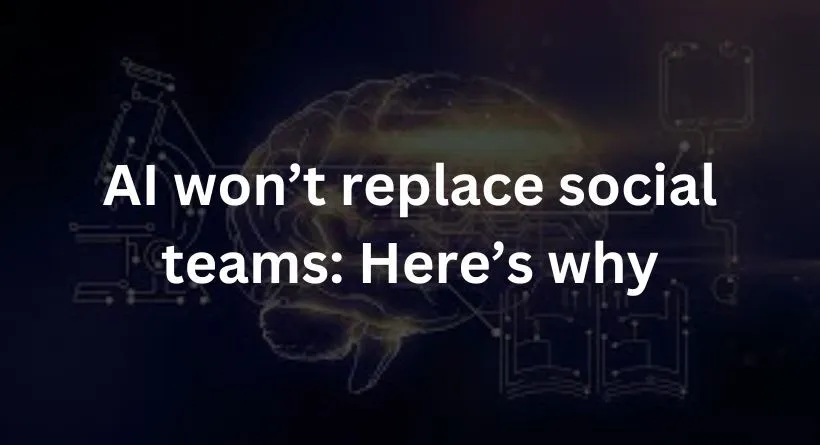
In today’s rapidly evolving technological landscape, the influence of artificial intelligence (AI) is undeniable. It has penetrated various aspects of our lives, from healthcare and finance to entertainment and customer service. While AI has undoubtedly brought about significant advancements, there are realms in which it is unlikely to replace the essential role of social teams. In this article, we will explore the reasons why AI won’t replace social teams and the unique value that human interaction brings to the table.
The Role of AI in the Modern World

AI is transforming the way we work and live. It excels at automating repetitive tasks, data analysis, and providing rapid responses to simple queries. Businesses have adopted AI-driven solutions to enhance efficiency, reduce costs, and improve customer service. However, the world of social interactions involves complexities that AI struggles to navigate.
You may also like reading: Jobs That AI Can’t Replace: The Impact of Automation on Workforce
The Importance of Social Teams
Social teams play a pivotal role in businesses and organizations. They are responsible for building and maintaining relationships with clients, customers, and colleagues. The success of a business often depends on the ability of social teams to connect with people on a personal level, understanding their needs, emotions, and aspirations.
AI’s Current Capabilities
While AI has made strides in natural language processing and understanding, it primarily relies on patterns and data analysis. It can mimic conversation, but it lacks genuine understanding. In contrast, humans possess the ability to comprehend nuances, emotions, and context, which are integral to effective communication.
Limitations of AI in Social Interaction
AI’s limitations become evident in situations that require emotional support, empathy, and complex decision-making. In social teams, it’s essential to respond to unique situations and adapt to various personalities. AI’s one-size-fits-all approach falls short in these scenarios.
Human Elements in Social Teams
Empathy and Emotional Intelligence
One of the key strengths of social teams is their capacity for empathy and emotional intelligence. They can sense and respond to the feelings and needs of others, offering a level of support that AI simply can’t match.
Understanding Complex Human Emotions
Humans excel in understanding complex emotions, such as grief, joy, or confusion. They can tailor their responses to these emotions, making interactions more meaningful.
The Art of Personal Touch
Social teams can add a personal touch to their interactions, making clients or customers feel valued and appreciated. This connection is challenging for AI to replicate.
Creativity and Adaptability
AI operates within predefined algorithms, limiting its creative problem-solving abilities. Social teams can think outside the box and adapt to unique situations.
Ethical and Moral Decision-Making
In situations requiring ethical or moral decisions, social teams rely on their values and principles. AI lacks the ability to make such judgments without predefined rules.
Cultural Sensitivity
Understanding and respecting cultural differences is vital in social interactions. Humans can navigate cultural nuances effectively, whereas AI may inadvertently offend or misunderstand.
Building Trust and Relationships
Trust is a fundamental element of social interactions. Social teams can build trust over time, whereas AI lacks the capacity to establish deep, meaningful relationships.
Challenges in Social AI Development

Developing AI that can truly replicate human social interaction is a complex task. It involves overcoming challenges related to ethics, data privacy, and the creation of AI systems that genuinely understand and respond to human emotions.
The Future of Social Teams
As technology continues to advance, the role of social teams may evolve, but it is unlikely to be replaced by AI entirely. The future likely involves a harmonious collaboration between humans and AI, where each leverages their strengths to deliver the best possible outcomes.
Conclusion
In conclusion, while AI has made significant strides in automating various aspects of our lives, it is unlikely to replace social teams. The unique human elements of empathy, emotional intelligence, adaptability, and cultural sensitivity make social teams indispensable. The future will likely see a coexistence between AI and social teams, each contributing its unique strengths to create a more connected and empathetic world.
FAQs
Can AI completely replace social teams?
No, AI cannot completely replace social teams because human interactions involve complex emotions, empathy, and adaptability that AI currently cannot replicate.
What are some limitations of AI in social interactions?
AI has limitations in understanding complex human emotions, making ethical decisions, and adapting to unique situations, which are crucial in social interactions.
How can social teams and AI work together in the future?
The future is likely to involve a collaborative approach, where social teams and AI complement each other’s strengths to enhance interactions and relationships.
What is the significance of empathy in social interactions?
Empathy is crucial in understanding and responding to the emotions and needs of others, making interactions more meaningful and supportive.
Are there ethical concerns related to AI in social interactions?
Yes, there are ethical concerns, particularly regarding data privacy and the potential for AI to make inappropriate or biased decisions in social contexts.





